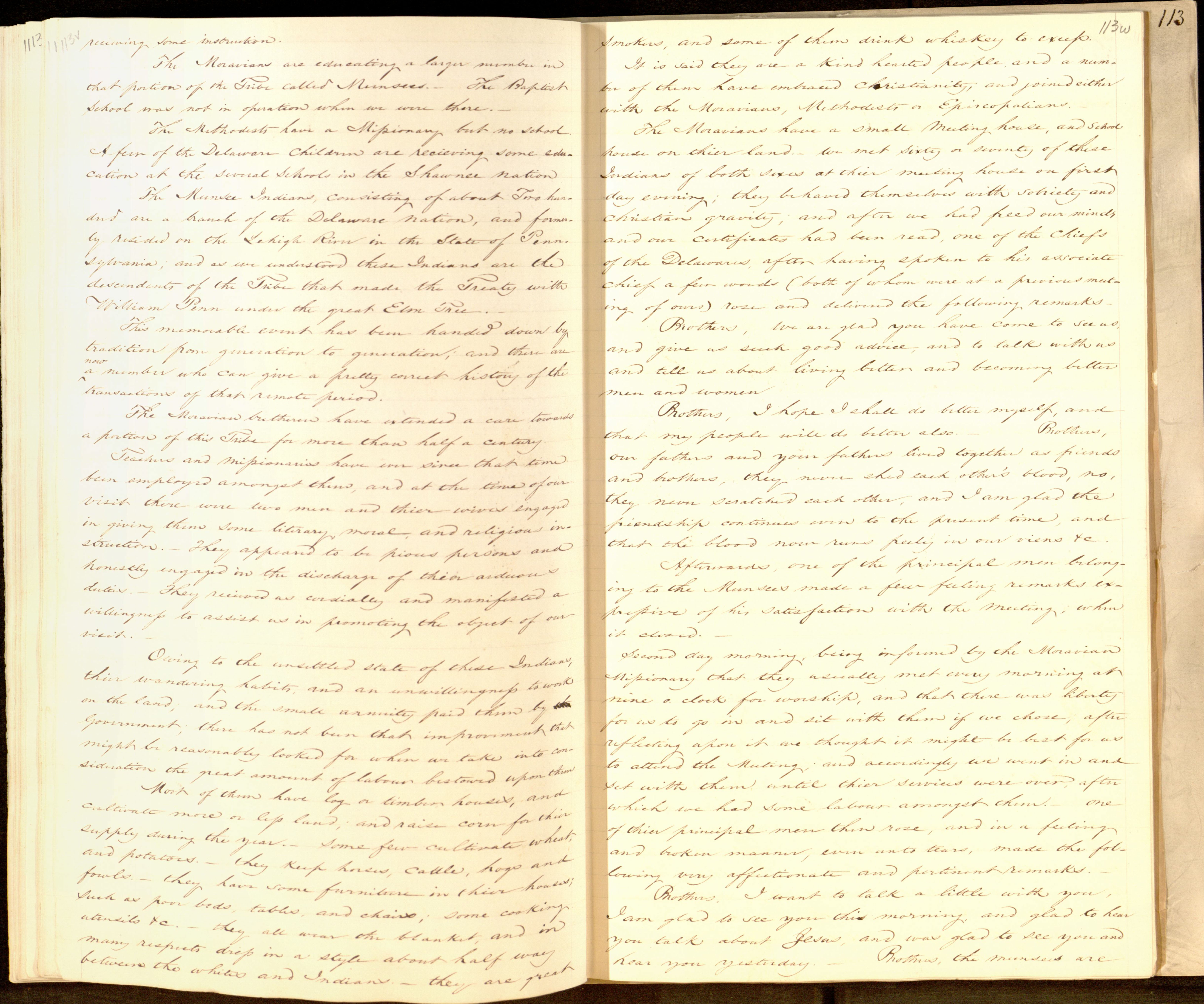receiving some instruction.
The Moravians
that portion of the Tribe called Munsees
school was not in operation when we were there.
The Methodists
A few of the Delaware
ucation at the several schools in the Shawnee
The Munsee
dred are a branch of the Delaware
ly resided on the Lehigh River
sylvania
descendents of the Tribe that made the Treaty with
William Penn
This memorable event has been handed down by
tradition from generation to
generation; and there are
now a number who can give a pretty correct
history of the
transactions of that remote period.
The Moravian
a portion of this Tribe for more than half a century.
Teachers and Missionaries have ever since that time
been employed amongst
them, and at the time of our
visit there were two men and thier wives
engaged
in giving them some literary moral, and religious in-
struction. They appeared to be pious persons and
honestly engaged in
the discharge of thier arduous
duties. They recieved as cordially and
manifested a
willingness to assist us in promoting the object of our
visit.
Owing to the unsettled state of these Indians,
thier wandering habits, and
an unwillingness to work
on the land; and the small annuity paid them by
Government
might be reasonably looked for when we take into con-
sideration the great amount of labour bestowed upon them
Most of them have log or timber houses, and
cultivate more or less land; and
raise corn for thier
supply during the year. Some few cultivate wheat,
and potatoes. They keep horses, cattle, hogs and
fowls. They have some
furniture in thier houses;
such as poor beds, tables, and chairs; some
cooking
utensils &c. They all wear the blanket, and in
many
respects dress in a state about half way
between the whites and Indians.
They are great
smokers, and some of them drink whiskey to excess.
It is said they are a kind hearted people, and a num-
ber of them have
embraced christianity, and joined either
with the Moravians
The Moravians
house on thier land. We met sixty or seventy of these
Indians of both sexes at thier meeting house on first
day evening; they behaved themselves with sobriety and
christian gravity; and after we had freed our minds
and our certificates had been read, one of the chiefs
of the Delawares
chief a few words (both of whom were at a previous meet-
ing of ours) rose and delivered the following remarks.
Brothers, We are glad you have come to see us,
and give us such good advice,
and to talk with us
and tell us about living better and becoming better
men and women
Brothers, I hope I shall do better myself, and
that my people will do better
also. Brothers,
our fathers and your fathers lived together as friends
and brothers, they never shed each other's blood, no,
they never
scratched each other, and I am glad the
friendship continues even to the
present time, and
that the blood now runs freely in our viens &c.
Afterwards, one of the principal men belong-
ing to the Munsees
pressive of his satisfaction with the meeting; where
it closed.
Second day morning, being informed by the Moravian
Missionary that they usually met every morning at
nine o clock for worship, and that there was liberty
for us to go in and sit with them if we chose; after
reflecting upon it we thought it might be best for us
to attend the Meeting; and accordingly we went in and
set with them until thier services were over, after
which we had some labour amongst them. One
of thier principal men then rose, and in a feeling
and broken manner, even unto tears, made the fol-
lowing very affectionate and pertinent remarks.
Brothers, I want to talk a little with you,
I am glad to see you this
morning, and glad to hear
you talk about Jesus, and was glad to see you and
hear you yesterday. Brothers the munsees

